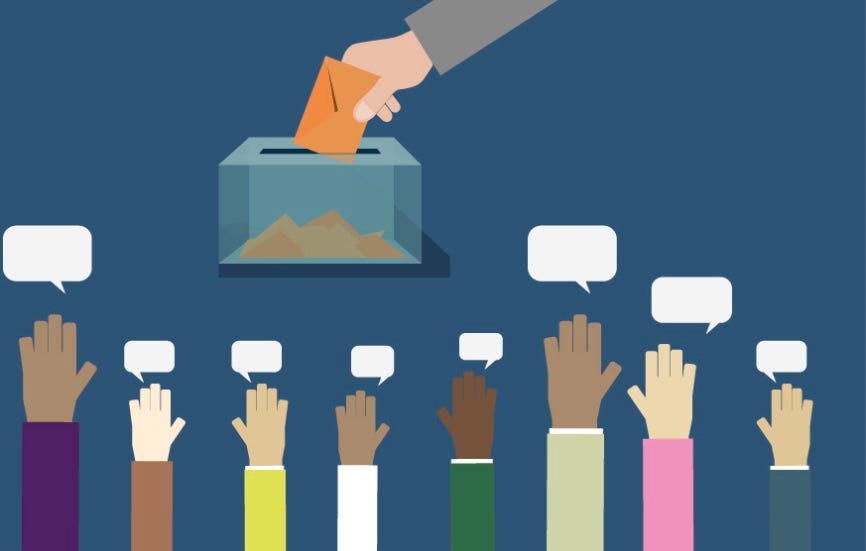New York Times columnist Jamelle Bouie wrote this week about the threats to our democratic republic.
Democracy, remember, is not just a set of rules and institutions. It is, as the philosopher John Dewey argued throughout his life, a set of habits and dispositions that must be cultivated and practiced if they are to survive and endure. “The struggle for democracy,” Dewey observed in his 1939 book Freedom and Culture, “has to be maintained on as many fronts as culture has aspects: political, economic, international, educational, scientific and artistic, religious.”
We do not practice democracy alone, of course. We do it together, in community, as equals. “Democracy as a way of life,” wrote Dewey in a later essay, “is controlled by personal faith in personal day-by-day working together with others.”
This concern about saving our democracy is expressed constantly in the news. The recent remarks by Trump about being a dictator for just “one day” raised alarm bells, although anyone who hadn’t heard those bells already might have a severe hearing problem. The shenanigans of the GOP, including, but not limited to, election denial, voter suppression, gerrymandering, and general antipathy to government, add to the broad uncertainty about our future.
Bouie’s references to John Dewey were apt, but not in the most important context. Dewey was among the seminal figures advocating for a progressive and democratic form of public education. Dewey-inspired schools practice democracy in and out of the classroom.
It is discouraging, but fully unsurprising, that the choruses of angst never include any phrases about education. It is as though we complain about an orchestra that doesn’t play very well without mentioning that the members didn’t have music lessons.
I intend no comprehensive education history lesson, but suffice it to note that the progressive/democratic approach to learning was in an ideological death struggle with a traditional/industrial model in the early 20th century. The industrial model dominated, modeled after Henry Ford’s assembly lines and reflected in the dismal design of school buildings that were - and are - nearly indistinguishable from factories. We are no more enlightened 100 years later, with emphases on economies of scale, returns on investment, standardization and near-worship of data and metrics.
The industrial model prevailed then and dominates now for the same reasons. Those with political and economic power don’t want to develop citizens with powerful critical capacities. They want to create workers for their wealth creation machinery. Listen to the incessant clamor for more STEM programs and vocational options in schools and colleges. Observe the decline in the humanities, which are seen as useless or pesky producers of poets, artists, writers, philosophers, historians and others who critique the parallel trends toward plutocracy and autocracy. Trump was quite serious when he quipped that he “liked the uneducated,” although ironically blind to the reality that he is among them.
Like Dewey’s schools, a small contingent of stubborn progressive schools still practice democracy in and out of the classroom. Many among these small numbers, are genuinely democratic, with students given a full voice in policy, governance and curriculum. These schools and many others are committed to consensus, debate, deliberation, compromise, participation and pluralism. Sounds rather like the components of a vibrant democratic society!
Schools today, especially those for “the other,” are increasingly rigid and autocratic. The daily practices in many public and charter schools are reminiscent of my days in Army Basic Training. And they have very similar purposes - training, not education. Children only see an autocratic model. Adults have unquestioned authority which intentionally inculcates an unquestioning compliance. This is among the reasons that so many Americans are slavishly devoted to a cartoonish despot.
Even students in so-called high achieving schools are conditioned toward compliance and conformity. There are “right” answers and one best spew them out with inerrancy if one hopes to move on to the next stage of the game.
Dewey’s first book on education was The School and Society: Being Three Lectures (1899). The theme of school and society is found in progressive schools to this day, reflecting the permeable boundary between education and civil society, each indispensable to the other. Students should engage in society outside of school and social realities should inform what happens in schools.
The companion concern is the dearth of civics education in schools. I wrote a longer-form piece about civics education for Yellow Scene magazine last year (Unseemly boasting: It won a Colorado Press Award). Rather than summarize or reiterate, I invite you to read it here.
Children must practice democracy and also learn how it works. Neither is happening. The current threat to democracy is acute, but the longer term threat is due to educational malfeasance.





Of course. I'm flattered. Many times think the same about yours. I hope you and yours are well.
Can I steal this and reprint on my blog?